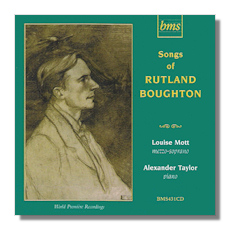
The Internet's Premier Classical Music Source
Related Links
- Latest Reviews
- More Reviews
-
By Composer
-
Collections
DVD & Blu-ray
Books
Concert Reviews
Articles/Interviews
Software
Audio
Search Amazon
Recommended Links
Site News
 CD Review
CD Review
Rutland Boughton

Songs
- 4 Songs, Op. 24
- 5 Celtic Love Songs
- 5 Songs of Womanhood, Op. 33
- 3 Songs, Op. 39
- 5 Symbol Songs
- Sweet Ass
Louise Mott, mezzo-soprano
Alexander Taylor, piano
British Music Society BMS431CD 70m DDD
Born in Aylsebury in 1878, Rutland Boughton can be credited with being the first British composer to attempt creating the first specifically British music drama. Works such as The Immortal Hour (1914), Betlehem (1915), Alketis (1922) and The Queen of Cornwall (1924) were cementing Boughton's reputation at the time.
The Immortal Hour, in particular took London by storm with over 600 performances that turned the composer into the leading British opera personality of the day. In 1926, however his Communist sympathies brought him into a collision course with the establishment and consequently his career began to suffer. Attempts to resurrect his opera festivals met only with partial success, and he devoted the rest of his artistic life to completing the cycle of five Arthurian music drams he had set out upon in 1908, and consolidating his compositional abilities by writing symphonies, concertos and chamber music. He died in January 1960 aged 82.
What about his songs though? Boughton wrote over 100 such pieces and when one listens to them, Finzi, Warlock and Britten do come to mind although he was not really interested in any historic overblowing but rather on social issues. Although Boughton's songs are scattered all over his musical career, the cycles on this recording cover only an 18 year period (1910-28). The subjects are many and varied, but the composer's innate sense of grasping that which is hidden in the words gives these songs a most insightful language that is both intimate and humane. Rare British repertoire wonderfully performed and presented.
Copyright © 2010, Gerald Fenech




















